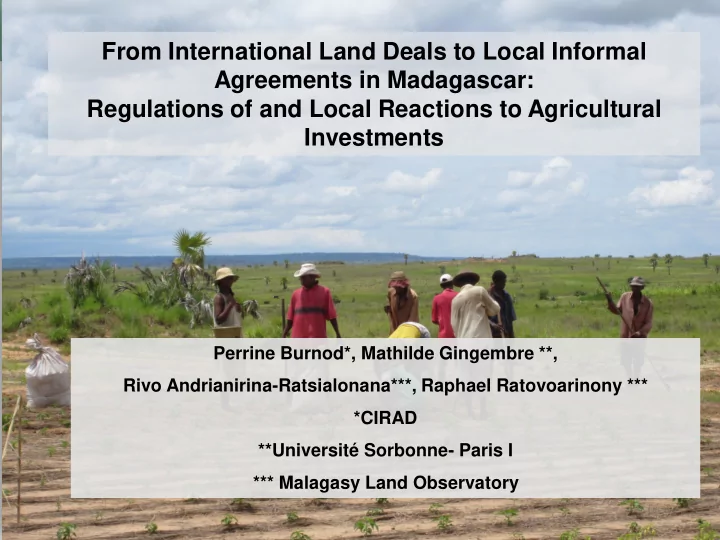

From International Land Deals to Local Informal Agreements in Madagascar: Regulations of and Local Reactions to Agricultural Investments Perrine Burnod*, Mathilde Gingembre **, Rivo Andrianirina-Ratsialonana***, Raphael Ratovoarinony *** *CIRAD **Université Sorbonne- Paris I *** Malagasy Land Observatory
Daewoo’s project – palm oil and corn on 1 300 000 ha - exemplified : - the paradoxical position of the government concerning land management = development of large-scale acquisition & land reform to secure local right - rhetorical use of land issue in political debate (cf. social mobilization against President Ravalomanana in 2009) But the trend of large scale acquisition continues : What are the dynamics of local politics relative to farmland acquisition projects? What are the impacts of the recent land reform on investors’ land access modalities?
1. Was the Daewoo’s case a turning point ? Current Malagasy government State Owned land - still supports international investment State - implements new legislation to regulate LAND - Public land services LEASE - Private land large-scale acquisition or unoccupied land => to centralize information => to recentralize land management in a Untitled private Local government property & local land office larger context of decentralisation, = -> certificates “occupied” land Ongoing land reform aim at securing local land Titled private property rights special status land ⇒ risks for local arise out of the tensions between (natural park) the legislation and its effective enforcement
2. Targeted land : overlapping rights realities 2005 - 2009, 52 projects listed Now, only 14 ongoing projects Surfaces under cultivation Targeted area = 3 millions ha Targeted area = 160 000 ha 23 000 ha
2. Targeted land : overlapping rights realities 14 medium private companies (European) Tanety coveted in the Boeny region Want to lease land (foreign investors) or to buy it (national = 1) 5 000 to 30 000 ha – mainly jatropha production Competition between investors Zones where different projects could have been planned
Layer 1 = legal rights Titled private property in the name of the State (done in the 1990’s for a Map made by the land natural reserve project) administration for a 20 000 ha project
Layer 1 = legal rights Titled private properties in State owned land the name of private or landowners Occupied land ? But no certificate..
Layer 2 = local rights villages Project delimitation roads crops savannah and pastures Layer 3 = legal use VOI zone rights (VOI rights) coal production zone
3. Land access, legal forum and tensions Main Land access Interlocutors Legal forum Claims Tensions Between Domain of investor and positive laws Few claim local groups State and Legal But illegal parts local elected Only drawing on procedure of the process positive law Amongst local representatives denying land arguments groups (mayors) rights .. even those secured Between State’s by a title services Local Several claims arrangements Local elected Domain of Informal representatives positive law Based on But tensions negotiation (Mayors) and positive law and amongst local local land rules local rules groups arguments Future risks if formal procedure
4. Private projects welcomed in the same way as international aid Private investments develop in a way that makes them look very much alike international aid projects. - investors commit themselves to building social infrastructures and to favoring local recruitment, -from some mayors’ point of view= a means to compensate for the deficiencies of the welfare state (school, wells) and to increase the local budget (land fees)., - members of the investor’s team coming from the “development” sphere Mayors become thus brokers of international private investment project -try to attract, control and redistribute ‘private investment revenue’ - mediate between investors and local groups - find trade-offs => Become the main interlocutor to the detriment of more communication with local landholders
Conclusions Legal recognition of right is necessary but not enough to empower local population (Vermeulen & Cotula, 2010) => consolidation of the land reform, through the expansion and the consolidation of the network of local land offices, is central to continue the difficult power redistribution in terms of land management. => larger information and negotiation at local level => Urgent need to produce of full information on these projects and to assess land tenure and land uses with the different stakeholders => first studies led by the Malagasy land observatory gathering investors, NGOs, representative of the civil society and research teams to feed the debate and negotiation about land access and to strengthen the respect of local land rights
Recommend
More recommend